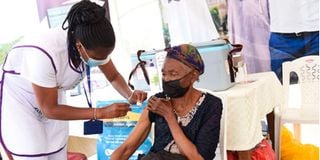Nearly half of the elderly have received Covid-19 jab, MoH says

Ms Mary Kusa, 63, receives a Covid-19 shot at the deputy county commissioner’s office in Dagoretti, Nairobi County, on January 3, 2022 during the launch of mass vaccination drive.
What you need to know:
- This follows a spirited campaign between the ministries of Health and Interior and community health volunteers.
- The Ministry of Health on December 10 last year introduced a vaccination drive targeting the elderly.
Almost half of the nation’s senior citizens have been vaccinated against Covid-19, marking a milestone in the war against the deadly virus, latest data from the Ministry of Health shows.
This follows a spirited campaign between the ministries of Health and Interior in partnership with community health volunteers (CHVs) to mobilise those aged 58 and above over the past one year.
Data released last Friday shows that about 44 per cent of elderly people have been fully vaccinated. The government had prioritised them for vaccination last March. Months later, only a small percentage of the targeted population of over two million people had been inoculated.
As of December 1, about 21 per cent of people in this group had been inoculated. National Vaccines Task Force Chair, Dr Willis Akhwale, told the Nation that the number, at the time, was worrying. “These are people who should be protected because of they are at risk,” he said.
The Ministry of Health on December 10 last year introduced a vaccination drive targeting the elderly. In February, it partnered with the interior to ramp up the vaccinations. County commissioners and chiefs and their assistants worked with county governments and community health volunteers.
Ms Mbinya Wambua, an assistant county commissioner in Western, said CHVs had done a great job in mobilising the elderly in the villages.
Vaccination rate
“CHVs are able to mobilise the elderly, especially in churches. Some visit them in their homes,” she said. The latest report shows that the vaccination rate has since doubled.
Regardless, the percentage of elderly people compared with other priority groups — such as teachers, healthcare workers and security officers — is still low. Data shows that more than 100 per cent of health workers have been fully vaccinated as well as about 90 per cent of teachers.
“We have tried to reach the elderly in remote areas because their number is still low. In Garissa, where vaccination sites are far from the villages, our health workers work with chiefs and their assistants to access villages for those interested in the jab,” said Dr Akhwale.
“We don’t just go to homes and start vaccinating people. We explain to them why they need it because most of them may not be aware of its importance. The results are promising as we have seen the numbers rising,” he added.
Ms Josephine Liluka, 63, received the Johnson and Johnson Covid-19 vaccine late last year. She had been hesitant for a while because a neighbour had told her that the jabs introduce foreign material to the body that could affect her health.
“I did not want to go for the vaccine. I only did it after the government said it was going to impose vaccine mandates. I fell sick in September and I was advised by the doctor to take the jab to protect myself in case I got infected,” she told the Nation yesterday.





